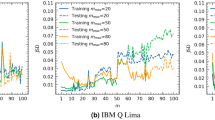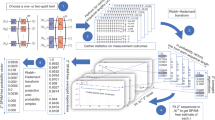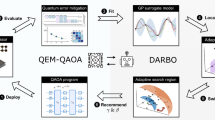Abstract
Noise in quantum computers can result in biased estimates of physical observables. Accurate bias-free estimates can be obtained using probabilistic error cancellation, an error-mitigation technique that effectively inverts well-characterized noise channels. Learning correlated noise channels in large quantum circuits, however, has been a major challenge and has severely hampered experimental realizations. Our work presents a practical protocol for learning and inverting a sparse noise model that is able to capture correlated noise and scales to large quantum devices. These advances allow us to demonstrate probabilistic error cancellation on a superconducting quantum processor, thereby providing a way to measure noise-free observables at larger circuit volumes.
This is a preview of subscription content, access via your institution
Access options
Access Nature and 54 other Nature Portfolio journals
Get Nature+, our best-value online-access subscription
$29.99 / 30 days
cancel any time
Subscribe to this journal
Receive 12 print issues and online access
$209.00 per year
only $17.42 per issue
Buy this article
- Purchase on Springer Link
- Instant access to full article PDF
Prices may be subject to local taxes which are calculated during checkout




Similar content being viewed by others
Data availability
Data are available from the authors upon reasonable request. Supplementary Fig. 7 in the supplementary information shows data representative of the performance of the cloud-based device ibm_hanoi, which is accessible online through the open-source Qiskit backend.
References
Zhang, E. J. et al. High-performance superconducting quantum processors via laser annealing of transmon qubits. Sci. Adv. 8, eabi6690 (2022).
Arute, F. et al. Quantum supremacy using a programmable superconducting processor. Nature 574, 505–510 (2019).
Wu, Y. et al. Strong quantum computational advantage using a superconducting quantum processor. Phys. Rev. Lett. 127, 180501 (2021).
Peruzzo, A. et al. A variational eigenvalue solver on a photonic quantum processor. Nat. Commun. 5, 4213 (2014).
Kandala, A. et al. Hardware-efficient variational quantum eigensolver for small molecules and quantum magnets. Nature 549, 242–246 (2017).
Kim, Y. et al. Scalable error mitigation for noisy quantum circuits produces competitive expectation values. Nat. Phys. https://doi.org/10.1038/s41567-022-01914-3 (2023).
Havlíček, Vojtěch et al. Supervised learning with quantum-enhanced feature spaces. Nature 567, 209–212 (2019).
Schuld, M. & Killoran, N. Quantum machine learning in feature Hilbert spaces. Phys. Rev. Lett. 122, 040504 (2019).
Temme, K., Bravyi, S. & Gambetta, J. M. Error mitigation for short-depth quantum circuits. Phys. Rev. Lett. 119, 180509 (2017).
Li, Y. & Benjamin, S. C. Efficient variational quantum simulator incorporating active error minimization. Phys. Rev. X 7, 021050 (2017).
Kandala, A. et al. Error mitigation extends the computational reach of a noisy quantum processor. Nature 567, 491–495 (2019).
Endo, S., Benjamin, S. C. & Li, Y. Practical quantum error mitigation for near-future applications. Phys. Rev. X 8, 031027 (2018).
Guo, Y. & Yang, S. Quantum error mitigation via matrix product operators. PRX Quantum 3, 040313 (2022).
Piveteau, C., Sutter, D. & Woerner, S. Quasiprobability decompositions with reduced sampling overhead. Npj Quantum Inf. 8, 12 (2022).
Endo, S., Cai, Z., Benjamin, S. C. & Yuan, X. Hybrid quantum-classical algorithms and quantum error mitigation. J. Phys. Soc. Japan 90, 032001 (2021).
Piveteau, C., Sutter, D., Bravyi, S., Gambetta, J. M. & Temme, K. Error mitigation for universal gates on encoded qubits. Phys. Rev. Lett. 127, 200505 (2021).
Takagi, R. Optimal resource cost for error mitigation. Phys. Rev. Res. 3, 033178 (2021).
Takagi, R., Endo, S., Minagawa, S. & Gu, M. Fundamental limits of quantum error mitigation. Npj Quantum Inf. 8, 114 (2022).
Lostaglio, M. & Ciani, A. Error mitigation and quantum-assisted simulation in the error corrected regime. Phys. Rev. Lett. 127, 200506 (2021).
Xiong, Y., Chandra, D., Ng, S. X. & Hanzo, L. Sampling overhead analysis of quantum error mitigation: uncoded vs. coded systems. IEEE Access 8, 228967–228991 (2020).
Suzuki, Y., Endo, S., Fujii, K. & Tokunaga, Y. Quantum error mitigation as a universal error reduction technique: Applications from the NISQ to the fault-tolerant quantum computing eras. PRX Quantum 3, 010345 (2022).
Song, C. et al. Quantum computation with universal error mitigation on a superconducting quantum processor. Sci. Adv. 5, eaaw5686 (2019).
Zhang, S. et al. Error-mitigated quantum gates exceeding physical fidelities in a trapped-ion system. Nat. Commun. 11, 587 (2020).
Strikis, A., Qin, D., Chen, Y., Benjamin, S. C. & Li, Y. Learning-based quantum error mitigation. PRX Quantum 2, 040330 (2021).
Bennett, C. H. et al. Purification of noisy entanglement and faithful teleportation via noisy channels. Phys. Rev. Lett. 76, 722–725 (1996).
Knill, E. Fault-tolerant postselected quantum computation: threshold analysis. Preprint at https://arxiv.org/abs/quant-ph/0404104 (2004).
Kern, O., Alber, G. & Shepelyansky, D. L. Quantum error correction of coherent errors by randomization. Eur. Phys. J. D 32, 153–156 (2005).
Geller, M. R. & Zhou, Z. Efficient error models for fault-tolerant architectures and the Pauli twirling approximation. Phys. Rev. A 88, 012314 (2013).
Wallman, J. J. & Emerson, J. Noise tailoring for scalable quantum computation via randomized compiling. Phys. Rev. A 94, 052325 (2016).
Breuer, H.-P. & Petruccione, F. The Theory of Open Quantum Systems (Oxford Univ. Press, 2002); https://doi.org/10.1093/acprof:oso/9780199213900.001.0001
Sun, J. et al. Mitigating realistic noise in practical noisy intermediate-scale quantum devices. Phys. Rev. Appl. 15, 034026 (2021).
Flammia, S. T. & Wallman, J. J. Efficient estimation of Pauli channels. ACM Trans. Quantum Comput. 1, 3 (2020).
Erhard, A. et al. Characterizing large-scale quantum computers via cycle benchmarking. Nat. Commun. 10, 5347 (2019).
Kimmel, S., da Silva, M. P., Ryan, C. A., Johnson, B. R. & Ohki, T. Robust extraction of tomographic information via randomized benchmarking. Phys. Rev. X 4, 011050 (2014).
Helsen, J., Xue, X., Vandersypen, L. M. K. & Wehner, S. A new class of efficient randomized benchmarking protocols. Npj Quantum Inf. 5, 71 (2019).
Harper, R., Flammia, S. T. & Wallman, J. J. Efficient learning of quantum noise. Nat. Phys. 16, 1184–1188 (2020).
van den Berg, E., Minev, Z. K. & Temme, K. Model-free readout-error mitigation for quantum expectation values. Phys. Rev. A 105, 032620 (2022).
Wack, A. et al. Quality, speed, and scale: three key attributes to measure the performance of near-term quantum computers. Preprint at https://arxiv.org/abs/2110.14108 (2021).
Acknowledgements
We thank S. Bravyi, D. T. McClure and J. M. Gambetta for helpful discussions. Research in characterization and noise learning was sponsored in part by the Army Research Office and was accomplished under Grant Number W911NF-21-1-0002. The views and conclusions contained in this document are those of the authors and should not be interpreted as representing the official policies, either expressed or implied, of the Army Research Office or the US Government. The US Government is authorized to reproduce and distribute reprints for Government purposes notwithstanding any copyright notation herein.
Author information
Authors and Affiliations
Contributions
K.T. and E.B. developed the theory. E.B., Z.M. and A.K. ran the experiments. All authors designed the experiments, analysed the data and wrote the paper.
Corresponding author
Ethics declarations
Competing interests
The authors declare no competing interests.
Peer review
Peer review information
Nature Physics thanks Ming Gong and Suguru Endo for their contribution to the peer review of this work.
Additional information
Publisher’s note Springer Nature remains neutral with regard to jurisdictional claims in published maps and institutional affiliations.
Supplementary information
Rights and permissions
Springer Nature or its licensor (e.g. a society or other partner) holds exclusive rights to this article under a publishing agreement with the author(s) or other rightsholder(s); author self-archiving of the accepted manuscript version of this article is solely governed by the terms of such publishing agreement and applicable law.
About this article
Cite this article
van den Berg, E., Minev, Z.K., Kandala, A. et al. Probabilistic error cancellation with sparse Pauli–Lindblad models on noisy quantum processors. Nat. Phys. 19, 1116–1121 (2023). https://doi.org/10.1038/s41567-023-02042-2
Received:
Accepted:
Published:
Issue Date:
DOI: https://doi.org/10.1038/s41567-023-02042-2
This article is cited by
-
Quantum error mitigation in the regime of high noise using deep neural network: Trotterized dynamics
Quantum Information Processing (2024)
-
Performing Distributed Quantum Calculations in a Multi-cloud Architecture Secured by the Quantum Key Distribution Protocol
SN Computer Science (2024)
-
Error-mitigated quantum simulation of interacting fermions with trapped ions
npj Quantum Information (2023)
-
Adaptive quantum error mitigation using pulse-based inverse evolutions
npj Quantum Information (2023)
-
Comparative study of adaptive variational quantum eigensolvers for multi-orbital impurity models
Communications Physics (2023)



